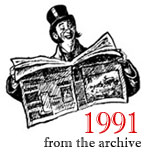
Christopher Lasch: A Loon on the Street Corner?
THE CAREER OF A MALCONTENT
The historian’s business is to reveal the less obvious features hidden from a careless eye in the present situation. What history can bring to moral and political life is a trained eye for the situation in which one has to act. — R.G. Collingwood
Christopher Lasch is a rare bird among American historians. His reputation is based more on his work as a social critic than on his explicitly historical writings. Most members of the profession, it seems, are willing to indulge their colleague: His observations are often trenchant and sound, his writing is sharp, and his comments on such diverse topics as education and sports are frequently illuminating. But behind their quick and spotty praise is a silent shaking of heads. Lasch is a fine historian who would most likely have been a leader in the profession if he had stuck to the task of writing closely argued, heavily footnoted studies. Instead he has wandered into the province of social criticism, the world of the elevated cocktail conversation, where his penchant for the quirky and idiosyncratic pronouncement has found its natural outlet. To be sure, his remarks are insightful, on occasion even brilliant, but they are said to be fundamentally flimsy, lacking the weight of scholarship.
Most reviewers of Lasch’s recent book, The True and Only Heaven, treated it with the same polite indifference. The reviews that were not incorrigibly hostile shared a common tone of exasperation. Lasch, they let it be known, has become wearisome with his incessant railing and nay-saying. The book, written in tones of lamentation punctuated with rebuke, was easily dismissed as a jeremiad. Once again the familiar complaints issued forth: Penetrating observations peppered an otherwise perverse book given to over-generalization, speculation, and a disrespect for evidence. Even a sympathetic and intelligent review, Louis Menand’s in The New York Review of Books, could not resist the temptation to make Lasch out to be a disgruntled crank, erudite but essentially wrongheaded.
It is perhaps no surprise that these reviewers — generally not historians — would be blinded by Lasch’s eccentricities and thus fail to note the critical vision that informs his work. But for historians to do so, and consequently relegate Lasch to the sidelines, demonstrates a disheartening unwillingness to accept the implications of their own best justifications for the study of history. Historical study help us better understand ourselves, the argument runs, either by informing us of our own past or by contrasting the development of our history with that of other peoples. The argument is further strengthened by the growing awareness in all disciplines of the historicity of human existence. Especially for historians engaged in the study of American history, the notion that intelligent decision-making, political or otherwise, demands a knowledge of the past serves as a stock response to endless student queries about why this stuff is important. It would seem a foregone conclusion, then, that if anyone is qualified gone by training to critique modern society it is the historian. Presumably he or she has developed the historical sensibility necessary for a sophisticated analysis of the current state of affairs.
You May Also Enjoy
The Faith Isn't Dead in France... The Pain of Infertility... What Affluence Has Wrought... Withholding Funeral Rites... Pushing Jews Away from Christ... In Defense of John Paul II... The Power of the Habit... and more
What Is a Pope's Proper Political Role?... An Absurd Fixation... An Article That Shouldn't Have Been Written... Perseverance in Poorly Chosen Vocations... Doing the Opposite... The Folly of the New Hegemony

